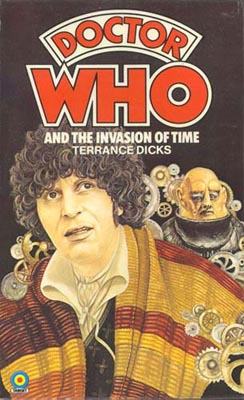The Invasion of Time
Doctor Who and the Invasion of Time

|
The Invasion of Time |
Target novelisation Doctor Who and the Invasion of Time |

|
| Author | Terrance Dicks |  |
| Published | 1980 | |
| ISBN | 0 426 20093 4 | |
| First Edition Cover | Andrew Skilleter |
| Back cover blurb: A traitor to the Time Lords? Can the Doctor really be in league with the evil Vardans, spearheading a treacherous invasion of his home planet, Gallifrey? Or is he playing a deadly double game, saving the Time Lords by appearing to betray them? But the Vardans themselves are only pawns in the game, and the Doctor faces an old and deadly enemy, as he battles to foil the Invasion of Time. |
A missed opportunity by Tim Roll-Pickering 21/1/06
Humour in a normally serious series is very difficult to pull off, especially when it is used not merely for joking asides but instead for actions in the narrative, here most obviously in the way that the Doctor often manages to get past both Time Lord and Sontaran guards by simply assuming authority and waltzing straight past them. On television these scenes just about work, though they help to take The Invasion of Time in a different direction from previous stories. In the printed form however, a straightforward adaptation of the scripts suffers because the style of humour just doesn't work in a different medium. As a result a lot of the story's jokes fall flat, most obviously the way that the supposedly all-powerful Vardans are revealed to be just a bunch of men who in many other stories would be mere background henchmen. For such humour to work in book form, it requires a more radical restructuring and reinterpretation than Target were prepared to go with at this stage in their history. Elsewhere the book shows signs of corners being cut, with a lot of noticeable typographical errors making it past the proofreaders, whilst the cover is rather uninspiring and totally gives away the villains (unlike the text and back cover).
Having said that, Terrance Dicks does make an effort to sort out a lot of the continuity problems. It is more explicit here than on screen that the Presidency has been vacant since the events of Doctor Who and the Deadly Assassin, whilst the confusion about the Great Key and the Rod of Rassilon is sorted out - here it is explicit that the Rod of Rassilon is not the Great Key seen in the previous story (which has been destroyed in the Master's scheme), whilst the previous Great Key was a fake designed to prevent Presdients finding the real key in the possession of the Chancellor. This makes more sense than on screen until one thinks about Chancellor Goth having been in line for the Presidency (and later on Borusa and Flavia), so just how would they have been restrained? The book is also more clear about the relationship between the Vardans and Sontarans.
In general this is quite a fast book to read, predominantly just adapting the television script with the occassional additional bit to explain a continuity point. There are a few deletions, such as the scene where Borusa challenges the Doctor about the sinking of the Titanic, whilst the scenes set in the interior of the TARDIS are treated in a very matter of fact way, totally oblivious to the fact that aside from the book version of Doctor Who in an exciting adventure with the Daleks this is the first time the interior has been properly explored. It is a sign of the general problems with Target that reached their height in 1980, a year when Terrance Dicks wrote no less than nine out of the ten novelisations released, with the result that many feel lightweight. This is especially a problem here, as this story is one of the few driven by the Doctor in a way that few others are. The opportunity to really play with the reader's expectations and really drag out the mystery is squandered (doubly so by the back cover blurb) and instead what we get is a straightforward retelling of the televised story. Fundamentally this just doesn't work for a story that is written in a highly visual manner. What the book needs to work is a radically different editorial policy that would allow for the story to be retold in a manner appropriate for the medium, but at this stage Target seemed obsessed with just churning the books out en masse. It is a great shame as in almost any other era of the novelisations this could have been something spectacular but here it becomes a mere standard entry. 4/10